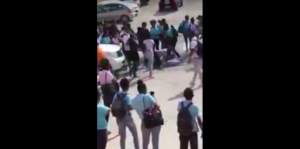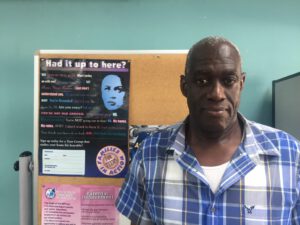PHILIPSBURG – 36 fights within 38 school days – a lot of school fights occurred during the start of the school year on Sint Maarten. These fights are being filmed and posted to social media. It seems to be a recurring social issue which is difficult to solve.
The police created the ‘See something? Share something’ campaign to acquire the school fight videos. Together with the Office for the Public Prosecutor they set up the taskforce school fights in October 2019.

Screen capture of video showing school fight on Sint Maarten
Geert Steeghs is involved with the project as a liaison for the Office of the Public Prosecutor: “We’ve had meetings with the child welfare board, schools, truancy officers, and the ministry of education. One of the concrete steps that flowed out of these meetings is that kids from different schools can no longer take the same school bus. The taskforce has created a sense of urgency but because the neighborhood officer is not on duty, the activities are on hold for the time being.”
There have been fewer reports of fights during the last couple of weeks. Rodney Davis, a social worker at the Sundial School says: “There was a fight at our school this schoolyear, right before Christmas. But it doesn’t just happen at school. Three weeks ago, uniformed kids started fighting each other in the neighborhood. A girl injured someone with a compass.”
‘School fights have come and gone over the years’- Rodney Davis, social worker
School fights are nothing new according to Davis. “School fights have come and gone over the years. The worst one I can remember happened around 2008/2009. When fights start happening, programs get set up. But as soon as the fights stop, so do the programs.”

Rodney Davis, social worker at the Sundial School – picture: Harriot Vonck
The school has a zero tolerance policy when it comes to weapons and violence, says Davis. We organize searches and bags are screened every morning by security personnel using metal detectors. The police, child welfare council, and truancy officers are also called in on a regular basis. “All these institutions work together to help the kids, but a few of them always slip through. A lot of kids don’t experience suspension as a punishment. And expelling them, I don’t find that to be a solution. Although that has happened once this year at Sundial, and twice last year at the Milton Peters College.”
According to him, to underlying problem is that violence is very normal on Sint Maarten. “The Peaceful Schools Committee completed a survey in 2009. As a part of that survey they asked kids which solutions they knew for solving conflicts. Ninety percent stated violence as a solution.”
‘After hurricane Irma there was no space to lock up juvenile delinquents’- Geert Steeghs of the Office for the Public Prosecutor
It’s a social issue, he says. “A lot of people say that they don’t believe in violence. But if you keep on asking, they admit to finding disciplinary methods quite normal. I’ve experienced parents who wanted to discipline their child right in front of me.”
The Office for the Public Prosecutor cites several other factors next to parents’ behavior: social inequality, economic instability, trauma, and a lack of a future perspective for the youth. Steeghs: “And there’s a lack of consequences. After hurricane Irma there was no space to lock up juvenile delinquents. The Miss Lalie Center (MLC) was reopened a few months ago. It’s a detention center for male juveniles. We still don’t have a place to hold female juveniles.”

Geert Steeghs and Miriam Mol of the Office for the Public Prosecutor – picture: Harriot Vock
The dismissal of the prison director last month leads to ‘worrisome consequences for the leadership and rebuilding of the didactic climate’ within the MLC according to the Office for the Public Prosecutor.
Electronic monitoring using ankle bracelets is possible since last week. Chief prosecutor Mirjam Mol on the subject: “It’s a start, but where the Office for the Public Prosecutor or the police would usually seek the assistance of different institutions, those just don’t exist here. Truancy officers don’t have the legal framework required to fine parents, victim support is non-existent, and there’s no mediation institution. There’s also a lack of mental healthcare facilities and foster families.”
Davis confirms: “There are no funds or space for children with complex behavioral issues. We are constantly putting out small fires instead of thinking about long term solutions. Violence is a learned behavior, one can forget it so to speak. But that takes generations. I’ve had Peacable Schools books on my shelves for three years now. It takes three hours a week, but the tutors only have one hour.”



